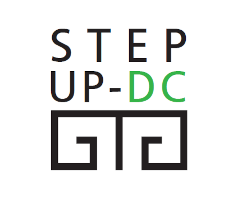SESSION 7C, LITERATURE - The experience of social discrimination: Teaching EDC/HRE through literature
STEPUP-DC Project


Course DescriptionBasic Topics
- Social discriminaton
- Teaching literature
Duration
The duration of the session is 9 hours (3 reading + 3 learning + 3 working/practicing)
Objectives
The Objectives of this session are:
- Develop students’ confidence in leading initiatives and developing educational programs on EDC/HRE/IE.
- To establish a firm understanding of how the teaching of canonical texts of literature can be used to promote democratic competences, employing different teaching approaches
Learning outcomes
On completion of the session the students will be able to:
- explore the experience of social discrimination through a poem by C.P. Cavafy
- identify how literary discourse enables the reader to develop attitudes, values and skills associated with EDC/HRE
- develop different teaching approaches to the text, enabling critical literacy (emphasis on the text, the reader, the cultural context)
Outcomes and CDC
- Knowledge and critical understanding
- Knowledge and critical understanding of culture, cultures, religions
- 2029: Can reflect critically on how power structures and discriminatory practices within cultural groups operate to restrict opportunities for disempowered group members (intermediate/advanced)
- Knowledge and critical understanding of language and communication
- 1913: Can reflect critically on the different communicative conventions that are employed in at least one other social group or culture (/advanced)
- Values
- Valuing cultural diversity
- 202: Promotes the view that one should always strive for mutual understanding and meaningful dialogue between people and groups who are perceived to be “different” from one another (basic)
- Attitudes
- Respect
- 508: Expresses respectful attitudes towards other people who differ from himself/herself (intermediate)
- Civic-mindedness
- 601: Expresses a willingness to co-operate and work with others (basic)
- 602: Collaborates with other people for common interest causes (basic)
- Tolerance of ambiguity
- 901: Engages well with other people who have a variety of different points of view (basic)
- 904: Is comfortable with many different kinds of people (basic)
- Skills
- Autonomous Learning Skills
- 1002: Seeks clarification of new information from other people when needed (basic)
- Analytical and critical thinking skills
- 1102: Uses evidence to support his/her opinions (basic)
- 1111: Can analyse alternative points of view (basic/intermediate)
- 1143: When it comes to solving a problem, he/she thinks about all of the things that are part of the problem before deciding what to do (advanced)
- Social discriminaton
- Teaching literature
The duration of the session is 9 hours (3 reading + 3 learning + 3 working/practicing)
The Objectives of this session are:
- Develop students’ confidence in leading initiatives and developing educational programs on EDC/HRE/IE.
- To establish a firm understanding of how the teaching of canonical texts of literature can be used to promote democratic competences, employing different teaching approaches
On completion of the session the students will be able to:
- explore the experience of social discrimination through a poem by C.P. Cavafy
- identify how literary discourse enables the reader to develop attitudes, values and skills associated with EDC/HRE
- develop different teaching approaches to the text, enabling critical literacy (emphasis on the text, the reader, the cultural context)
- Knowledge and critical understanding
- Knowledge and critical understanding of culture, cultures, religions
- 2029: Can reflect critically on how power structures and discriminatory practices within cultural groups operate to restrict opportunities for disempowered group members (intermediate/advanced)
- Knowledge and critical understanding of language and communication
- 1913: Can reflect critically on the different communicative conventions that are employed in at least one other social group or culture (/advanced)
- Knowledge and critical understanding of culture, cultures, religions
- Values
- Valuing cultural diversity
- 202: Promotes the view that one should always strive for mutual understanding and meaningful dialogue between people and groups who are perceived to be “different” from one another (basic)
- Valuing cultural diversity
- Attitudes
- Respect
- 508: Expresses respectful attitudes towards other people who differ from himself/herself (intermediate)
- Civic-mindedness
- 601: Expresses a willingness to co-operate and work with others (basic)
- 602: Collaborates with other people for common interest causes (basic)
- Tolerance of ambiguity
- 901: Engages well with other people who have a variety of different points of view (basic)
- 904: Is comfortable with many different kinds of people (basic)
- Respect
- Skills
- Autonomous Learning Skills
- 1002: Seeks clarification of new information from other people when needed (basic)
- Analytical and critical thinking skills
- 1102: Uses evidence to support his/her opinions (basic)
- 1111: Can analyse alternative points of view (basic/intermediate)
- 1143: When it comes to solving a problem, he/she thinks about all of the things that are part of the problem before deciding what to do (advanced)
- Autonomous Learning Skills
A series of resources that the student teacher must study in this session and a series of additional resources for further study.
A full paper and additional e-lessons on the topics of the session and additional interactive presentation of the materials, for the student teachers to study all the materials in a row.
A series of authentic, up to date and relevant activities with their accompanying materials, which deliver the intended learning outcomes of the session and are carried out face to face or E-learning with groups of student teachers.
Several types of questions to evaluate how much the student teachers have learned throughout the session (reading material, learning material and workshop).
